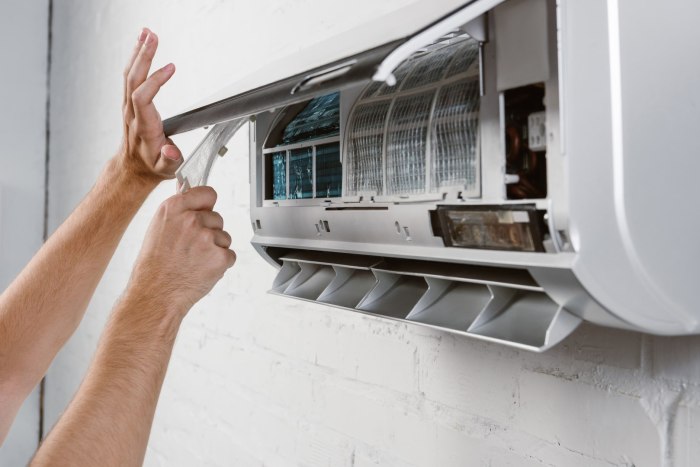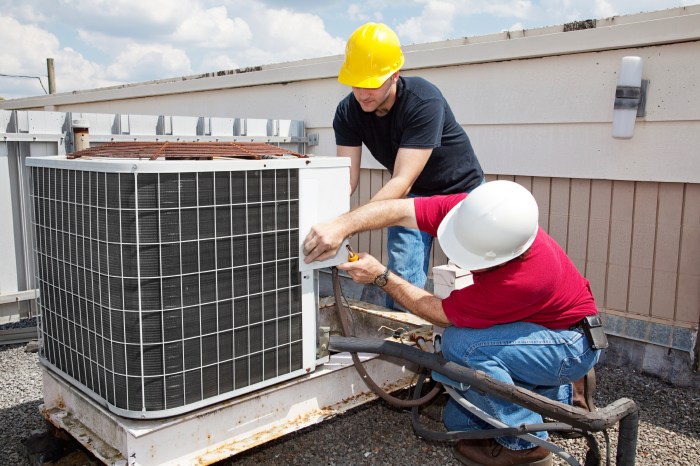Troubleshooting Guide for Air Conditioning Unit Repair
Exploring the realm of air conditioning unit repair, this guide aims to provide a comprehensive overview of common issues, DIY troubleshooting tips, the importance of regular maintenance, and the value of professional repair services. Delve into this informative piece for valuable insights into keeping your air conditioning unit in top shape.
Common Air Conditioning Unit Problems
When it comes to air conditioning units, there are several common issues that can arise, impacting the efficiency and performance of the system. It is essential to address these problems promptly to prevent further damage and costly repairs.
Refrigerant Leaks
Refrigerant leaks are a common issue that can lead to reduced cooling capacity and system failure. If left unchecked, these leaks can cause the air conditioner to work harder, resulting in increased energy consumption and higher utility bills.
Dirty or Clogged Filters
Dirty or clogged filters can restrict airflow, reducing the efficiency of the air conditioning unit. This can lead to poor indoor air quality, uneven cooling, and strain on the system, potentially causing it to break down prematurely.
Thermostat Issues
Malfunctioning thermostats can lead to temperature inconsistencies and discomfort in your home. It is crucial to address thermostat issues promptly to ensure optimal comfort and energy efficiency.
Electrical Problems
Electrical problems, such as faulty wiring or capacitor issues, can cause the air conditioning unit to malfunction or fail completely. Ignoring these issues can lead to safety hazards and costly repairs.
DIY Troubleshooting Tips
When dealing with air conditioning unit problems, homeowners can try some basic troubleshooting techniques before calling a professional. It is important to follow safety measures and have the necessary tools on hand to avoid accidents and ensure a successful repair.
Checking the Thermostat
To start troubleshooting your air conditioning unit, check the thermostat settings to make sure it is set to cool and the temperature is lower than the current room temperature. If the thermostat is not working properly, it may need new batteries or calibration.
Inspecting the Air Filter
One common issue that can affect the performance of an air conditioning unit is a dirty or clogged air filter. Regularly inspect and replace the air filter if it is dirty to ensure proper airflow and efficient cooling.
Cleaning the Condenser Unit
The condenser unit, located outside the house, can accumulate dirt, debris, and leaves over time, hindering its ability to release heat. Use a hose to gently clean the condenser coils and remove any obstructions to improve the unit's efficiency.
Checking the Circuit Breaker
If your air conditioning unit is not turning on, check the circuit breaker to see if it has tripped. Reset the breaker if necessary and monitor the unit to ensure it starts up properly.
Inspecting the Ductwork
Leaky or disconnected ductwork can lead to poor airflow and inefficient cooling. Inspect the ducts for any visible leaks, gaps, or obstructions, and seal or repair them as needed to improve the overall performance of your air conditioning system.
Safety Measures and Necessary Tools
When performing DIY repairs on your air conditioning unit, always prioritize safety by wearing protective gear, turning off power to the unit, and following manufacturer's instructions. Additionally, have the following tools on hand for troubleshooting:
- Screwdrivers
- Pliers
- Multimeter
- Vacuum cleaner
- Hose
Importance of Regular Maintenance

Regular maintenance is crucial in ensuring the longevity and efficiency of your air conditioning unit
Role of Cleaning and Replacing Filters
One of the key maintenance tasks for air conditioning units is cleaning and replacing filters regularly. Dirty filters can restrict airflow, reducing the unit's efficiency and causing it to work harder to cool your space. This can lead to increased energy consumption and potential damage to the system.
By cleaning or replacing filters every 1-3 months, depending on usage, you can maintain optimal airflow and improve the overall performance of your air conditioner.
Maintenance Schedule
To keep your air conditioning unit in optimal condition, it is recommended to follow a maintenance schedule. Here is a general guideline:
- Clean or replace filters every 1-3 months
- Check and clean evaporator and condenser coils annually
- Inspect and clean the drain line to prevent clogs
- Ensure proper lubrication of moving parts
- Check refrigerant levels and adjust if needed
- Schedule professional maintenance at least once a year
Regular maintenance not only helps in preventing major breakdowns but also extends the lifespan of your air conditioning unit, saving you money in the long run.
Professional Repair Services

When it comes to fixing your air conditioning unit, you may be torn between attempting a DIY repair or hiring a professional service. Let's weigh the benefits of opting for professional repair services over tackling the job yourself.
Benefits of Hiring Professional Repair Services
- Expertise: HVAC technicians have the knowledge and experience to accurately diagnose and fix issues with your unit.
- Efficiency: Professionals can complete repairs in a timely manner, minimizing downtime for your cooling system.
- Quality Work: Professional repair services often come with warranties, ensuring that the job is done right the first time.
Qualifications of a Reputable HVAC Technician
- Certifications: Look for technicians who are certified by organizations like NATE (North American Technician Excellence).
- Experience: Check how long the technician has been in the industry and ask for references or reviews from previous clients.
- Licensing: Ensure that the technician holds the necessary licenses required by your state or local regulations.
Tips for Choosing a Reliable Repair Service Provider
- Ask for Recommendations: Seek referrals from friends, family, or neighbors who have had positive experiences with HVAC repair services.
- Check Online Reviews: Look for reviews and ratings on platforms like Google or Yelp to gauge the reputation of the repair service provider.
- Get Multiple Quotes: Compare quotes from different repair companies to ensure you are getting a fair price for the services needed.
Last Point
In conclusion, taking proactive measures in addressing air conditioning unit problems, conducting regular maintenance, and seeking professional repair services when needed are key to ensuring the longevity and efficiency of your unit. Stay informed, stay cool, and enjoy the comfort of a well-functioning air conditioning system.
Q&A
What are some common warning signs that indicate the need for air conditioning unit repair?
Some common warning signs include weak airflow, strange noises, foul odors, and inconsistent cooling.
Is it safe to perform DIY repairs on an air conditioning unit?
While basic troubleshooting can be done by homeowners, more complex repairs should be left to professionals to avoid safety hazards and further damage.
How often should air conditioning units undergo maintenance?
It is recommended to schedule maintenance at least once a year to ensure optimal performance and prevent major breakdowns.